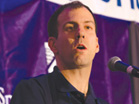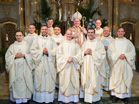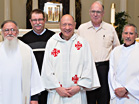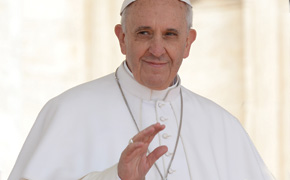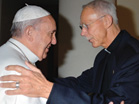
By Brian Harper
Jesuit Fr. John Schlegel's desire for a peaceful close to his priestly ministry has been well-earned.
He spent the majority of his career in the stressful hub of higher education, serving as president of the University of San Francisco and Creighton University – "In all humility but all honesty," he notes, "I transformed two major institutions to be free-standing, nationally-recognized entities" – in addition to holding posts at John Carroll University and Marquette University. He also served as president and publisher of America, the Jesuits' national weekly magazine.
So when he came to Milwaukee, Wis., as pastor of Church of the Gesu, it seemed his wish to lead a parish and preach in a way that gave parishioners "something to chew on" had been granted.
It had. In ways he never could have imagined.
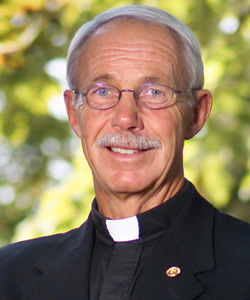
|
|
| Fr. John Schlegel, SJ |
|
|
Listen to Fr. Schlegel in his own words. |
The diagnosis was not entirely a surprise. For six months, he had been experiencing a mysterious stomach ailment. Initial tests were inconclusive, but he found himself "acting very strangely, because I was not a creature of my own habits" while vacationing with friends over Christmas last year. Father Schlegel began to confront the possibility of his impending mortality.
"I said, 'There's something going on inside, and how are you going to respond to this?' I did that reflection, looking at my past life. It's been incredibly rich, gifted, and I've done some wonderful things, they tell me. I've touched many, many people, and I just sat there and said, 'That's enough.'
"And maybe my best lesson is yet to come."
Father Schlegel's first lesson came in his calm acceptance of his fate. He opted for "a noninvasive approach, no chemo or radiation treatment."
"In the end," he wrote in a letter to Creighton's community, "I was interested in the 'quality of life' not the longevity of life. I wanted to have time to say 'goodbye' and farewell to the people and places I love."
These goodbyes have happened at joyful "living wakes" planned and attended by friends in San Francisco, Denver, Omaha, and other places throughout the country. He also takes time to graciously respond to the "extraordinarily overwhelming" letters, cards, and e-mails overflowing his inbox.
"Be at peace," he revealed to Marquette's student newspaper, is his go-to response. "I am."
While he acknowledges physical discomfort – "I know the pain is coming. It was here yesterday, vividly. You just have to somehow offer that up or baptize it into the form that you want it to be" – Fr. Schlegel has already outlived his doctors' predictions and maintains his characteristically active schedule and zest for life.
Upon receiving his news, he drew up a bucket list that included a return to England, where he earned his doctorate and first fell in love with opera and rowing, as well as new experiences, like a Mass and private audience with Pope Francis.
"I found it as sort of a summation of my entire Jesuit life," says Fr. Schlegel. "I was affirmed by not just a pope but a Jesuit pope. He said, 'How are you doing?' I said, 'I'm doing fine. What can we do for you?' And he says, 'You can continue to pray for me, you can push the borders, and you can be concerned about refugees and migrants.'"
Father Schlegel's homilies and interactions have also taken on a new depth colored by his "lens adjustment." His sermon on Holy Thursday was particularly profound, as he shared his insight that Jesus washing his disciples' feet was not only an act of service but also, in light of their imminent denial, betrayal, and abandonment, an act of forgiveness."I looked out at the congregation and said, 'I've just discovered this. Don't take 40 years to find the place of forgiveness in your life.'"
Revelations like this, he says, are not uncommon since his "wakeup call."
"My thing about finding God in all things," he says, "you just never know where it's going to happen. So you just let it happen."
Letting it happen is an apt description for the way Fr. Schlegel initially discovered his vocation. When signing up for a mandatory retreat in college, he accidentally chose a weekend for seminarians.
"Once I got over the initial shock of 'Oh, my God, I'm with a group of seminarians,' I started to listen, and the Jesuit retreat director started to make sense. And four months later I was in the Jesuits. So it was either a lark or the Holy Spirit, but 52 years later, I think it was about the Spirit." That the Spirit could have led him where it has brings two words to mind: wonderment and gratitude.
"A little, blue collar kid finding himself at Oxford, finding he had a fit in higher education, seeing the world, looking at the Great Wall, looking at the Sydney Opera House, looking at Kruger National Park, etcetera, etcetera," he marvels. "I've done it all. It's wild. Who would have thought this would happen?"
For the most part, though, Fr. Schlegel keeps his gaze on the time at hand.
"For me, the beauty of the moment is the moment. My lenses are much more focused in the present."
He does, however, allow his thoughts to wander into how he would like to be remembered.
"I keep saying my headstone should be 'He meant well.' I think the best thing to say is, 'He helped build God's kingdom and included me.'"
Perhaps an answer also lies in his Holy Thursday homily. That evening, Fr. Schlegel spoke about his recent practice of revisiting hundreds of photographs for a glimpse of his extraordinary life.
"Photos are, of course, a vehicle to remember," he said. "And we want to remember. We need to remember. And remembrance is at the very heart of what we celebrate tonight. But Jesus did not leave us photographs in a shoebox. He left us something much better. He left us himself. He left us an example."
Family, friends, and admirers throughout the country and world would surely say the same of Fr. Schlegel.
Brian Harper is the communications specialist for the Midwest Jesuits.
